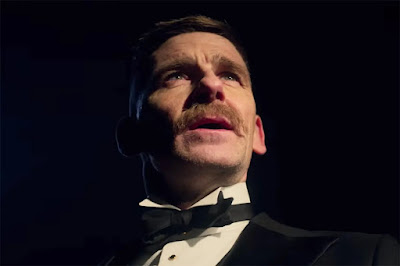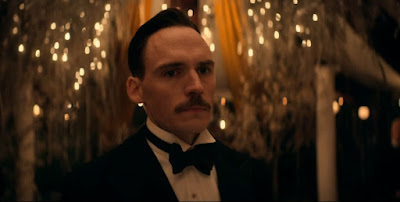Polly is such a delight. This episode shows her many facets. Walking “barefoot on the cobbles.” Resisting the siren call of the opium trade until she realizes she can use it to improve Michael’s standing. Getting engaged to Aberama, who calls her a “Gypsy queen.” Advising Arthur to move past Linda and find “someone who might be able to put your fires out.”
And shooting Linda.
Wow, what a cliffhanger! That scene is so tense: the men on this show are always waving guns around, but whenever a woman gets her hand on a piece (like Lizzie did in the second episode of this season) everyone is stunned. Polly obviously shoots Linda to protect Arthur, but I wonder if she also shoots Linda because she (Polly) is so angry at Gina’s influence on Michael. It can be two things, of course.
 |
| Poor Arthur. |
Poor Arthur. We saw in this episode something we’ve seen in many others: even in moments of extraordinary pain, Arthur is able to put a smiling face on it, like when he greets Polly at the shipyard. He’s also aware of how far is too far—like getting into the opium trade. But that “fire” is simmering just under the surface: Charlie (in the last episode) and Polly (in this one) have both warned Arthur not to let it get out of control. Tommy is really the one who needs to step up, of course.
When Linda pulls the gun on Arthur, he just closes his eyes and waits to be shot. Poor Arthur. I can’t say it enough.
 |
| Ugh. |
Oswald Mosley, on the other hand, is a schmuck. He’s sleeping with his wife, his mother-in-law, and his sister-in-law. He tries to treat Lizzie badly (and she does a great job fighting back). Worst of all, he’s a snob. His line about the horrors of brandy before dinner was such a stupid flex: is his privilege the only thing he can use to intimidate Tommy? Does Mosley really think that’s intimidating? (And does Tommy care? Back in Season Three he went on a rant about how "those bastards will never let us into their palaces"--but is that what he really wants?)
Mosley reveals more of himself than he intends to, or perhaps he is so comfortable with himself that he doesn’t bother to hide anything. His questions about Tommy’s reading habits are interesting, though: does Tommy read Freud? Yes. Has he read Mosley's favorite, Nietzsche? No, says Tommy.
I’m not sure if that’s true, though: later in the episode, Tommy tells Lizzie that she may have known Mosley “before you became who you are,” which echoes a Nietzsche line about how we ought to “become who you are.” I’m not sure if that’s just a coincidence, or if Tommy lied to Mosley. That doesn’t seem like something Tommy would lie about. This is bothering me more than it should.
At first, I thought Mosley’s iconic line about “two men for whom forbidding is forbidden” was a Nietzsche quote, but then I realized I was thinking of Camus: “Everything is permitted does not mean that nothing is forbidden.” These guys haven’t gotten to the existentialists yet, though. It’ll take another war for that to happen.
Anyway, Mosley thinks Tommy is a perfect mixture of the Apollonian and Dionysian impulse, which tells us nothing about Tommy and everything about Mosley’s willingness to psychologize based on nationalist essentialism masquerading as philosophy.
 |
| These boys do know how to set a scene. |
The bigger insight into Tommy’s psychology is the scene with Ada. First, that he goes to her for help at all. Not Lizzie, not Arthur. Not Polly. But Ada, who rarely minces words but always winds up supporting him in the end.
Second, that he has rejected the offers of psychoanalysis and is, instead, thinking through his issues in terms of Traveller spirituality. Steven Knight describes his goals for this mystical element of the show: “I’ve always wanted within Peaky Blinders to treat Gypsy spirituality as real, it’s not just hallucination. In a certain way, it’s a different reality. He’s in between the real world and a different one.”
Like Arthur’s embodied psychomachia, this is a situationally appropriate way of thinking through mental illness. Ethan Watters’s book Crazy Like Us: The Globalization of the American Psyche does a good job of synthesizing research on how societies outside of the US think about (or thought about, prior to the American soft-power hegemony of the current system) mental illness and mood disorders. I like that Knight is showing us a world at the cusp, as psychoanalysis is a new trend that not everyone wants to follow, and not a brand-new thing but a new strategy that gradually replaces old strategies.
Tommy’s hallucination/dream about the boat is fascinating: it is his father’s boat, named The January. Grace is half-buried under coal, much as the opium is completely buried. And it travels down “the Cut,” the Birmingham canals where Tommy threw his war medals. Most of that dream speaks for itself, but I want to highlight the boat’s name: January, named after Janus, the two-faced god who looks both forward and back in the middle of "the bleak midwinter."
That doesn’t mean, obviously, that Tommy is developing healthy coping strategies. He’s hooked on laudanum, he doesn’t sleep, he keeps hallucinating Grace, and for the past few episodes has been playing with a bullet. “We’ve never gotten off [Dad’s boat],” says Tommy. “And we never will.” He’s caught in “the loop” (episode title!) and doesn’t know how to get out of it.
“There is a part of me that is unfamiliar to me and I keep finding myself there,” he says. I hope that “unfamiliar” part is the good side, the side that looks to the future and sees hope rather than more misery. I am not, however, optimistic.
Distilled for the Eradication of Seemingly Incurable Sadness:
• Jimmy McCavern: “Which foot do you use to kick the ball?” I’ve watched this episode three times, and each time my first reaction to this line is to wonder if Jimmy is asking Tommy if he is gay.
• Finn sat behind the desk in the office while Arthur managed the singer who is rigging the football matches. I’m only mentioning this now because it will be relevant later.
• Aberama doesn’t read. I love how he phrases this. I love Aberama in this episode. In fact, I love everything he does in this season.
• During the second shipyard scene, Charlie is about to drink a toast to the truce between Tommy and the Billy Boys, but he refuses to drink when he realizes that Tommy does, in fact, have a death wish.
• I don’t watch a lot of ballet on my own time, so whenever a show sets a scene at a ballet, I think of the Angel episode “Waiting in the Wings.” Arthur falling asleep therefore made me think of Cordelia doing exactly the same thing.
This was a sneaky episode, and I mean that in the best way. Not just the shooting at the end, but the little scene with the dead songbirds, the little character moments throughout. Just lovely work throughout.
Four out of four songbirds.
Josie Kafka is a full-time cat servant and part-time rogue demon hunter. (What's a rogue demon?)


No comments:
Post a Comment
We love comments! Just note that we always moderate because of spam and trolls. It's never too late to comment on an old show, but please don’t spoil future episodes for newbies.